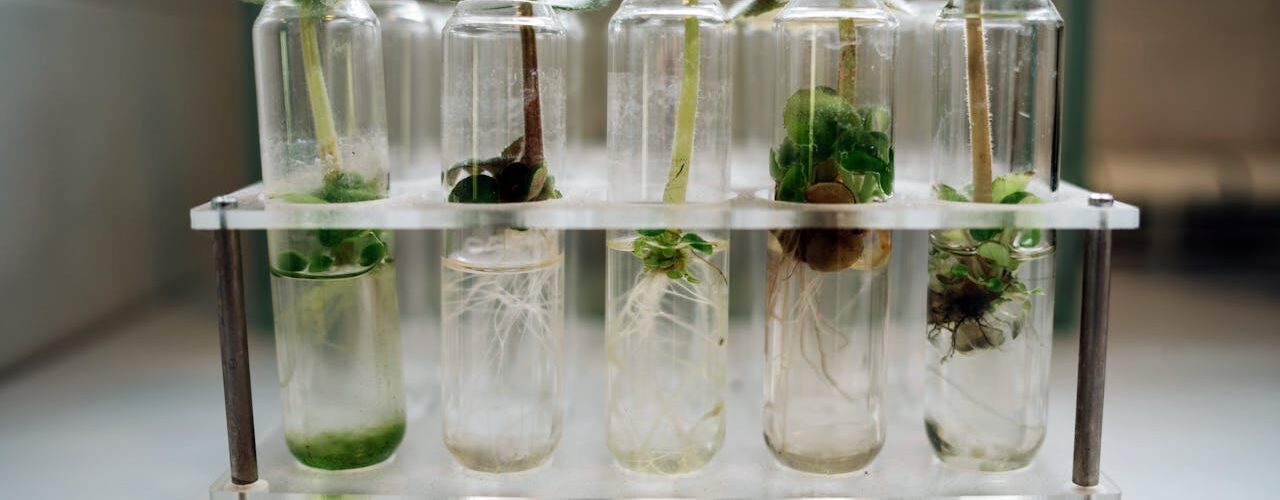About 40 km from the heart of Delhi, in Faridabad (Haryana), sits the office of Dharaksha Ecosolutions, a biotech startup that makes biodegradable materials using mycelium-based technology.
We have listed Dharaksha Ecosolutions in our annual 11 Indian Green Startups of 2024.
In the same list, we also had Pune-based BioPrime that develops biomolecules to help farmers from the risk of extreme weather events. The biotech company makes products with plant-based ingredients and botanical extracts using a patented technology.
In our 2022 edition, we had Bengaluru-based Sea6 Energy and Mumbai-based Zerocircle, leveraging seaweed to contribute to a more sustainable future. Later last year, Sea6 Energy signed an agreement with India’s leading petroleum company, HPCL, to convert seaweed into biofuels.
Dharaksha Ecosolutions, BioPrime, Sea6 Energy and Zerocircle are a small sample of a growing list of Indian startups involved in the production of bio-based products through the cultivation of microorganisms, cells, or plant materials in controlled environments.
According to the India Bioeconomy Report 2025, the number of biotech startups in the country has grown from 50 in 2014 to more than 10,000 in 2024, playing a crucial role in sustainability, energy security, and improving the quality of life for millions of people.

Through these biotech companies, along with the policy initiatives, research advancements, and government support, India is positioning itself as a global powerhouse in bioeconomy. The country aims to become a hub for bio-manufacturing, backed by strong R&D infrastructure, cutting-edge technologies, and a skilled scientific workforce.
The bioeconomy utilises renewable biological resources to produce food, energy, and industrial goods, promoting sustainability and economic growth.
India’s bioeconomy has experienced remarkable growth over the past decade.
While releasing the India Bioeconomy Report 2025, Minister of Science and Technology, Jitendra Singh, mentioned that the country has witnessed a sixteen-fold growth from $10 billion in 2014 to a projected $165.7 billion in 2024, exceeding the target of $150 billion by 2025.
Accounting for 4.25% of the national GDP, the sector has maintained a strong compound annual growth rate (CAGR) of 17.9% over the last four years. With an ambitious goal of reaching $300 billion by 2030, India’s bioeconomy sector is set to play a critical role in shaping the country’s future as a knowledge-driven, bio-enabled economy.
This impressive growth of the bioeconomy sector in India highlights the country’s strategic focus on biotechnology as a key driver of sustainable economic development and innovation.
The focus is on creating a resilient industrial ecosystem that promotes the development and commercialization of new biotech products, while unlocking opportunities in urban and rural regions. India also seeks to lead globally in bio-pharma, including vaccines, diagnostics, and therapeutics.
Innovations such as gene editing and bioprinting are driving advancements, while cross-sector integration amplifies the long-term impact. By aligning biotechnology with digital technologies and circular economy principles, the bioeconomy provides sustainable solutions to environmental challenges and enhances societal well-being.
In August 2024, the Indian government launched the BioE3 (Biotechnology for Economy, Environment and Employment) Policy, which marks a significant step in India’s biotechnology sector.
The BioE3 Policy introduces key initiatives such as advanced biomanufacturing facilities, bio-foundry clusters, and bio-AI hubs to support bio-based product development and commercialization.
These centers will bridge lab-to-market gaps and foster collaboration across startups, SMEs, and industry. With a strong focus on employment, the policy aims to generate jobs in tier-II and tier-III cities by leveraging local biomass. It also emphasizes ethical biosafety and alignment with global regulatory standards to boost India’s global biotech competitiveness.
A month later, in September 2024, the government also approved a scheme ‘Biotechnology Research Innovation and Entrepreneurship Development (Bio-RIDE)’ to support cutting-edge research and development in Biotechnology.
The BioRIDE scheme aims to accelerate Biofoundries, Biomanufacturing Hubs, and Bio-Al Hubs development in India, focusing on bio-based chemicals, smart proteins, precision biotherapeutics, climate-resilient agriculture, carbon capture, and futuristic marine and space research.
Another transformative area strengthening India’s bioeconomy goals is bioenergy, a form of renewable energy derived from organic materials known as biomass, which can be used to produce transportation fuels, heat, electricity, and products.
The biofuel industry (which includes the production of ethanol, biodiesel, and biogas) has emerged as a reliable alternative to fossil fuels. It is helping the country reduce dependency on imported fuels, save money, lower emissions and provide an indigenous energy source.
Ethanol blending has seen a significant rise, from 1.53% in 2014 to 15% in 2024, with a target of 20% blending by 2025. This shift has reduced crude oil imports by 173 lakh metric tons, saved $11 to $12 billion in foreign exchange and cut 519 lakh metric tons of CO₂ emissions.
Supportive policies have encouraged the use of varied feedstocks, including maize, damaged rice, and sugarcane byproducts, backed by structured incentives. Second-generation ethanol refineries are converting agricultural residues and bamboo into fuel, strengthening the circular economy and reducing pollution.
These developments highlight how bioenergy contributes to energy security, sustainability, and rural development, providing economic benefits to Indian farmers.
Wrapping Up

India’s bioeconomy stands at a defining moment, with its integrated approach to innovation, sustainability, and inclusive development setting a global benchmark.
To achieve an ambitious target of $300 billion by 2030, the growth rate required is more than 10% CAGR, which will need continuous policy reforms, cutting-edge research, and a strong emphasis on collaboration across sectors.
The convergence of bio-manufacturing, bio-agriculture, and bioenergy not only strengthens resilience but also signals India’s strategic intent to lead in the emerging global bioeconomy.
It aligns with the vision of a cleaner, greener, and more prosperous future by promoting regenerative biomanufacturing and a shift from chemical-based industries to sustainable bio-based models.
The progress and growth in India’s bioeconomy sector support a circular economy and align with the country’s goal of net-zero carbon emissions by 2070. This approach contributes significantly to the ‘Make in India’ initiative by fostering the development of biobased products with minimal carbon footprints.
As India moves forward, this cohesive and future-oriented vision lays the foundation for a more sustainable, self-reliant, and bio-enabled economy.
The article is written by Varun, Founder of Change Started





Add comment